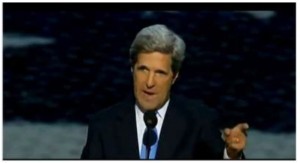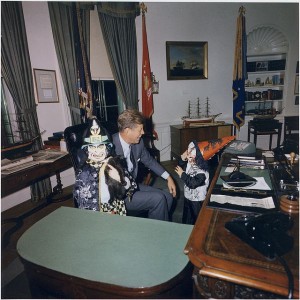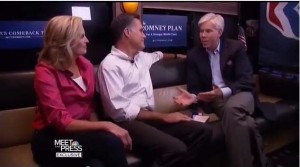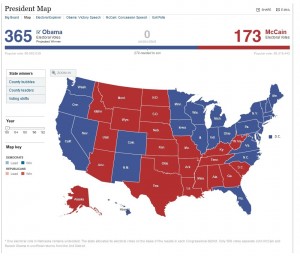Last time I argued that Fox News’ ethos was damaged following the Democratic National Convention for criticizing President Obama’s never using the word “God” in his keynote address, and therefore not appealing to Christian voters, even though he quoted a passage from the Bible. But Fox News isn’t running for President of the United States, and this race may therefore not be affected by faith-related credibility issues discussed by news networks. President Obama, however, may have taken a credibly hit during the convention where dozens spoke on stage in support of his campaign. One such supporter was Massachusetts Senator John Kerry, who was widely critiqued (and justifiably so, it would seem) for being a “flip-flopper” on important issues during his 2004 presidential campaign.

Figure 3: John Kerry calling for Mitt Romney to seek consistency on major issues campaign.
If not merely ironic, John Kerry’s 2012 DNC Speech comes with little situated ethos, and ultimately because the speech occurred at the Democratic National Convention, it harms President Obama, who is the ranking member of the Democratic Party. Just as Fox News’ comments about President Obama’s lack of “God” references sheds doubt on the networks credibility, comments like Kerry’s call in to question whether or not the public can trust what representatives of the Democratic Party have to say.
But will diminished credibility have an impact on the election at large? It’s hard to say.
In 2008 I found Senator Clinton’s support of then-Senator Obama odd, though I wasn’t surprised by it. Judging by Obama’s landslide victory, Clinton’s credibility was not harmed by several debates worth of disagreement with the candidate. In general Clinton certainly agreed with Obama’s platform much more so than McCain’s. As such, the two-party system engenders a stance that requires individuals to vote for the candidate they disagree with less, not necessarily the one they agree with the most.
So what is the role of ethos in a nation-wide election? Does credibility really matter as long as the candidate eventually says or does “the right thing” in the eyes of the voting public? It didn’t harm President Obama when Hillary Clinton supported him even after months of strong, public disagreement on key issues. In a country where a significant portion of voters care whether or not a candidate goes to church, will claims by conservative media outlets that President Obama doesn’t support Christian ideals harm Governor Romney’s campaign if it comes to light that these criticisms are unfounded? Will having an accused “flip-flopper” deride Governor Romney of changing his platform damage President Obama’s re-election campaign? I don’t think so. And rhetoricians who put stock in ethos may just find this troubling.
Series References
ABS News. Transcript: President Obama’s DNC speech. September 6, 2012. Retrieved from: http://abcnews.go.com/Politics/OTUS/transcript-president-obamas democraticconvention-speech/story?id=17175575&singlePage=true#.UE1P27KPV-8%29
Boston Globe. Anti-Mormon bias facing Mitt Romney is as strong as what his father faced in1967, poll shows. June 21, 2012. Retrieved from: http://www.boston.com/politicalintelligence/2012/06/21/anti-mormon-bias-facing-mittromney-strong-what-his-father-faced-pollshows/L5j6dCabnhjQvarTu4WOCK/story.html
Meet the Press. Sepbember 9: Mitt Rmney, Ann Romney, Julian Castro, Peggy Noonan, E.J. Dionne, Bill Bennett, Chuck Todd. September 9, 2012. Retrieved from: http://www.msnbc.msn.com/id/48959273/ns/meet_the_press-transcripts/t/september-mittromney-ann-romney-julian-castro-peggy-noonan-ej-dionne-bill-bennett-chucktodd/% 29.#.UE4CZJYmV8E
Politico. John Kerry DNC speech (text). September 6, 2012. Retrieved from: http://dyn.politico.com/printstory.cfm?uuid=2B54C58E-0840-DBFA-16F527C6553BF562
The Daily Show. Hope and change 2 – last week this week. September 7, 2012. Retrieved
from: http://www.thedailyshow.com/watch/fri-september-7-2012/hope-and-change-2– lastweek-this-week
The Huffington Post. Robert Jeffress, southern Baptist pastor who called Mormonism a ‘Cult,’ endorses Mitt Romney. April 17, 2012. Retrieved from: http://www.huffingtonpost.com/2012/04/17/robert-jeffress-mitt-romneyendorsement_
n_1433215.html?
The New York Times. John Kerry’s DNC Full Speech – Elections 2012. September 6, 2012. Retrieved from: http://www.youtube.com/watch?v=u8WtLqKJcTk
The New York Times. Presidential map. December 9, 2008. Retrieved from: http://elections.nytimes.com/2008/results/president/map.html




